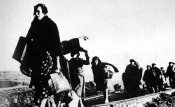Hastayım, yaşıyorum görünmez hayâliyle
Belki bir gün, bir gün diye, beklerim ümîd ile
Çürüyor zavallı kalbim aşkının hasretiyle
Belki bir gün, bir gün diye, beklerim ümîd ile
Belki bir gün, bir gün diye, beklerim ümîd ile
Çürüyor zavallı kalbim aşkının hasretiyle
Belki bir gün, bir gün diye, beklerim ümîd ile
Contributed by DonQuijote82 - 2011/10/15 - 17:08
I problemi testuali della canzone
Il famoso testo di Hastayım, yaşıyorum, pur così breve, presenta alcune varianti testuali. Il testo da noi riportato è quello in grafia turca completa (con indicazione delle vocali lunghe); una variante comune è la seguente:
(si noti qui hayalimle "nella mia memoria" al posto di hayaliyle "nella memoria").
Il testo iscritto sulla tomba di Udi Hrant è invece così riportato:
Le varianti, come si vede, derivano dalla grafia del suffisso -(i)le, che è assai fluttuante nel turco moderno.
Una parola anche sul testo riportato nel libretto dell'album Defixiones, Will and Testament di Diamanda Galás. Oltre a non distinguere tra i e ı, riporta gelir diye al posto di bir gün diye. Vi sono inoltre alcuni refusi.
Il famoso testo di Hastayım, yaşıyorum, pur così breve, presenta alcune varianti testuali. Il testo da noi riportato è quello in grafia turca completa (con indicazione delle vocali lunghe); una variante comune è la seguente:
Hastayım yaşıyorum , görünmez hayalimle
Belki bir gün , bir gün diye, beklerim ümidiyle
Çürüyor zavallı ruhum , aşkının hasretiyle
Belki bir gün , bir gün diye, beklerim ümidiyle
Belki bir gün , bir gün diye, beklerim ümidiyle
Çürüyor zavallı ruhum , aşkının hasretiyle
Belki bir gün , bir gün diye, beklerim ümidiyle
(si noti qui hayalimle "nella mia memoria" al posto di hayaliyle "nella memoria").
Il testo iscritto sulla tomba di Udi Hrant è invece così riportato:
Hastayım yaşıyorum , görünmez hayal ile
Belki bir gün , bir gün diye, beklerim ümidile
Çürüyor zavallı ruhum , aşkının hasretile
Belki bir gün , bir gün diye, beklerim ümidile
Belki bir gün , bir gün diye, beklerim ümidile
Çürüyor zavallı ruhum , aşkının hasretile
Belki bir gün , bir gün diye, beklerim ümidile
Le varianti, come si vede, derivano dalla grafia del suffisso -(i)le, che è assai fluttuante nel turco moderno.
Una parola anche sul testo riportato nel libretto dell'album Defixiones, Will and Testament di Diamanda Galás. Oltre a non distinguere tra i e ı, riporta gelir diye al posto di bir gün diye. Vi sono inoltre alcuni refusi.
Riccardo Venturi - 2011/11/11 - 21:43
Language: English
[I AM ILL BUT LIVING]
I am ill but living because of your memory
I wait with hope that someday you will return
My poor heart is decaying with longing for your love
I wait with hope that someday you will return
I am ill but living because of your memory
I wait with hope that someday you will return
My poor heart is decaying with longing for your love
I wait with hope that someday you will return
Contributed by DonQuijote82 - 2011/10/15 - 17:09
Language: Italian
Versione italiana di Riccardo Venturi
(dalla versione inglese)
11 novembre 2011
(dalla versione inglese)
11 novembre 2011
×
![]()
Note for non-Italian users: Sorry, though the interface of this website is translated into English, most commentaries and biographies are in Italian and/or in other languages like French, German, Spanish, Russian etc.










Lyrics and music by Udi Hrant Kenkulian
Album: Defixiones Will and Testament
Istanbul: la tomba di Udi Hrant Kenkulian. Il nome è in lingua armena, le iscrizioni in armeno e in turco. Sulla tomba sono riportati i versi di questa canzone.
Istanbul: Udi Hrant Kenkulian's grave. His name is in the Armenian language, the grave inscriptions in Armenian and Turkish. The lyrics of this song are reproduced on the gravestone.
The performance, with songs performed over five languages, is a concert for piano and voice which includes Ms. Galás' own transcendent compositions set on the words of exiled poets from around the world.
SONGS OF EXILE (“Canzoni di Esilio”) tratta del poeta, del musicista e del compositore che vive in esilio, lontano dalla sua terra, e parla di coloro che hanno dovuto vivere fuori dalla legge, come se fossero banditi, e creare case dai sassi.
La composizione, con canzoni interpretate in cinque lingue, è un concerto per piano e voce comprendente le composizioni trascendenti di Diamanda Galás adattate alle parole di poeti esiliati di tutto il mondo.
SONGS OF EXILE (“Chansons d'Éxile”) parle du poète, du musicien et du compositeur vivant en éxile, éloigné de sa terre, et de ceux qui ont dû vivre hors de la loi, comme s'il étaient des bandits, et bâtir des maisons à partir de la pierre.
La composition, avec des chansons interprétées en cinq langues, est un concert pour piano et voix comprenant les compositions transcendentes de m.me Galás qui ont été adaptées aux paroles de poètes éxilés du monde entier.
"Defixiones Will and Testament" è incentrato sul genocidio armeno, anatolico e greco che ebbe luogo, per la maggior parte, con il pretesto della Prima guerra mondiale (1914-1917). L'Impero Ottomano, ora Repubblica Turca, usò vari mezzi di distruzione per mettere in pratica una politica di pulizia etnica. Lo scopo non era soltanto quello di uccidere, ma di cancellare ogni traccia culturale dell'esistenza di questi popoli.
"Defixiones, Will and Testament" se centre sur le génocide armenien, anatolique et grec qui a eu lieu, pour la plupart, sous le prétexte de la Première guerre mondiale (1914-1917). L'Empire Ottoman, à présent République de Turquie, a employé de nombreux moyens de destruction pour mettre en acte une politique de nettoyage éthnique. Le but n'était pas seulement de tuer, mais d'effacer et anéantir toute trace de l'existence même de ces peuples.
THE DANCE:
1. The Dance [Պարը] - Ter Vogormia [Տէր Ողորմյա]
2. The Desert [الصحراء] Part I
3. The Desert [الصحراء] Part II
4. Sevda zinciri
5. Holokaftoma [Ολοκαύτωμα; Holocaust, Olocausto]
6. Ter Vogormia [Տէր Ողորմյա] (reprise)
7. The Eagle Of Tkhuma [ݎܸܫܒ݅ܐ ܒܼܬܚܗܼܡܹܐ]
8. The Orders From the Dead
DISC B
SONGS OF EXILE:
1. Hastayım yaşıyorum
2. Σαν πεθάνω στο καράβι
3. Je rame
4. Epístola a los transeúntes
5. Birds Of Death
6. Άνοιξε, άνοιξε
7. Todesfuge
8. Artémis
9. See That My Grave Is Kept Clean
Nato nel 1901 a Istanbul da una famiglia armena, Hrant Kenkulian (in grafia turca: Kenkılyan o Kenkülyan) è stato uno dei maggiori musicisti e suonatori di oud del XX secolo (il prenome Udi significa appunto “suonatore di oud”). Fu dichiarato cieco quattro giorni dopo la nascita; nel 1915 dovette scappare a Konya con la famiglia per sfuggire al genocidio armeno. Hrant Kenkulyan visse comunque tutta la sua vita in Turchia senza particolari problemi, e scrisse la maggior parte delle sue canzoni in lingua turca; è considerato uno dei maggiori innovatori nella pratica dello oud. Nel 1928 si innamorò di Ağavini, la sorella di un suo allievo; i genitori di lei, però, non acconsentirono al matrimonio perché non volevano che la figlia sposasse un musicista. I due si incontrarono di nuovo, per caso, nel 1937 e poterono sposarsi dieci anni più tardi; nel frattempo, Udi Hrant aveva scritto molte canzoni che esprimevano il desiderio per il suo amore assente. La più famosa è questa, talmente celebre da essere stata iscritta persino sulla sua tomba. Le sue prime registrazioni risalgono al 1927, ma è negli anni '30 che Udi Hrant raggiunge fama internazionale (con registrazioni effettuate per la RCA Victor). Durante tutta la vita Udi Hrant si sottopose inutilmente a cure e operazioni per riacquistare la vista; durante una di queste, negli anni '50, effettuò una tournée negli Stati Uniti. La fama di Udi Hrant era tale, che gli fu permesso senza alcuna conseguenza di pubblicare, in Turchia, dischi contenenti canzoni anche in lingua armena; da notare che non mise piede in Armenia (allora una Repubblica Socialista Sovietica) fino al 1963, quando vi tenne una tournée. Le sue canzoni in armeno sono comunque non molte: si ricordano Parov yegar sirown yar, Sirown aγčig, Anowš yaren heraca, Khrjit e Srdis vra kar me ga. Udi Hrant morì il 29 agosto 1978 per un cancro.